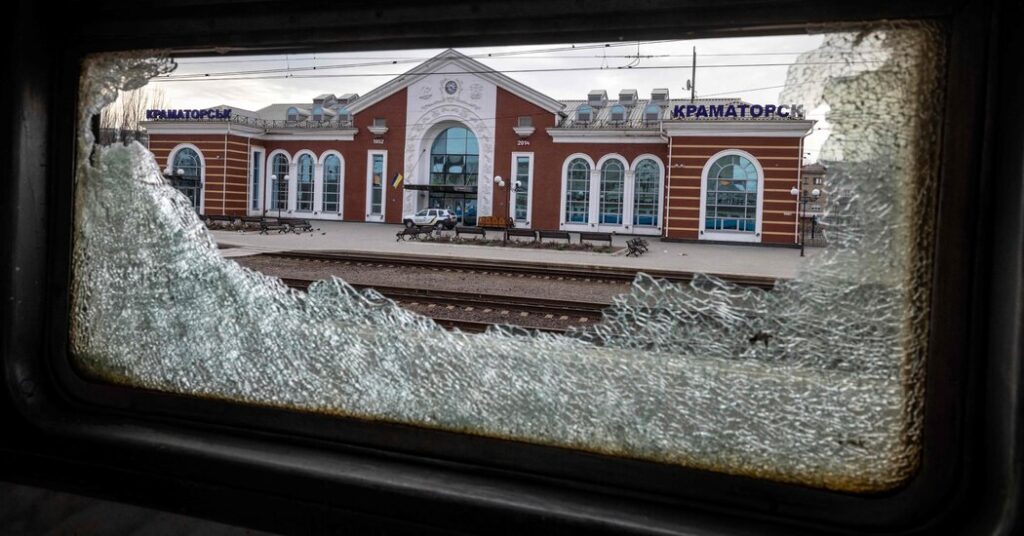
Keeping calm for her baby became Alina Shynkar’s quiet, personal battle in the Ukraine war. She checked into Maternity Hospital No. 5 in the capital, Kyiv, before the war began in late February for bed rest because of a risk of preterm labor, only to witness the hospital unravel into a chaotic, panicked state weeks later.
“The girls were under so much stress they started to deliver” prematurely, she said. Doctors in her hospital moved frightened pregnant women, some of them already in labor, in and out of a bomb shelter multiple times a day. Some were crying and some were bleeding.
The Russian assault on Ukraine has been a nightmare for expectant mothers, particularly in cities like Mariupol, Kharkiv and Chernihiv that have been under almost constant bombardment from the beginning of the war in late February.
In the besieged city of Mariupol, in southern Ukraine, last month, Russian artillery struck a maternity hospital, resulting in the death of a woman and her unborn child and wounding a number of pregnant women, according to the Ukrainian authorities.
Women in war zones throughout the country have been forced to give birth in cold, decrepit basements or subway stations crowded with people cowering from shelling, and without electricity, running water or midwives to assist them.
As of late March, Russian missiles, bombs and artillery had destroyed at least 23 hospitals and health clinics.
Even those pregnant women fortunate enough to escape the war torn areas are deeply stressed, racing in and out of shelters during air raids or enduring arduous and perilous journeys to the relative safety of western Ukraine or to neighboring European countries.
An estimated 265,000 Ukrainian women were pregnant when the war broke out, according to the United Nations Population Fund, the organization’s sexual and reproductive health agency. About 80,000 births are expected in the next three months.
The war poses both immediate and long-term risks to mothers, fathers and newborns. Among them are premature births, which can lead to a host of complications both immediately and later in life.
Dr. Jeanne Conry, the president of the International Federation of Gynecology and Obstetrics, said a lack of access to medication to prevent postpartum hemorrhage could result in an increase in deaths of mothers. Babies are at risk, she said, because physicians might not have immediate access to the necessary equipment to resuscitate them, and they have only moments to catch their first breath.
Dislocation and stress are affecting virtually all of Ukraine’s pregnant women. Doctors say that refugees who are pregnant and their babies face a higher risk of disease, death during childbirth and mental health issues that can carry over after the birth. Displaced people have higher rates of premature birth, low birth weight and stillbirth, according to doctors.
When an air-raid siren wailed one recent day at the hospital, the stairway filled with women from the maternity ward clutching their bellies and shuffling down to the shelter, a warren of low-ceilinged corridors and storage rooms. One room was converted into a makeshift post-operation observation room and neonatal site. Another, still cluttered with filing cabinets, became a birthing room. Women rested on mats on the floor.
In Kyiv, another complication is a 9 p.m. to 6 a.m. curfew that leaves pregnant women wholly reliant on ambulances.
Yulia Sobchenko, 27, said she went into labor around midnight on March 20 and took an ambulance to the hospital. But she was delayed by Ukrainian soldiers at checkpoints who, fearful of saboteurs, insisted on opening the ambulance door to verify that it was a woman about to give birth.
Her child was delivered at 2:55 a.m. Within two hours, she was ushered into the basement because of an air-raid alert.
“Me in my sleeping shirt and with a cloth between my legs and a tiny baby just after giving birth, and my husband with all our bags, had to go to the basement,” she said.
Her son, Mykhailo, was healthy and weighed 6 pounds 3 ounces at birth, she said, and “is a child of war.”

